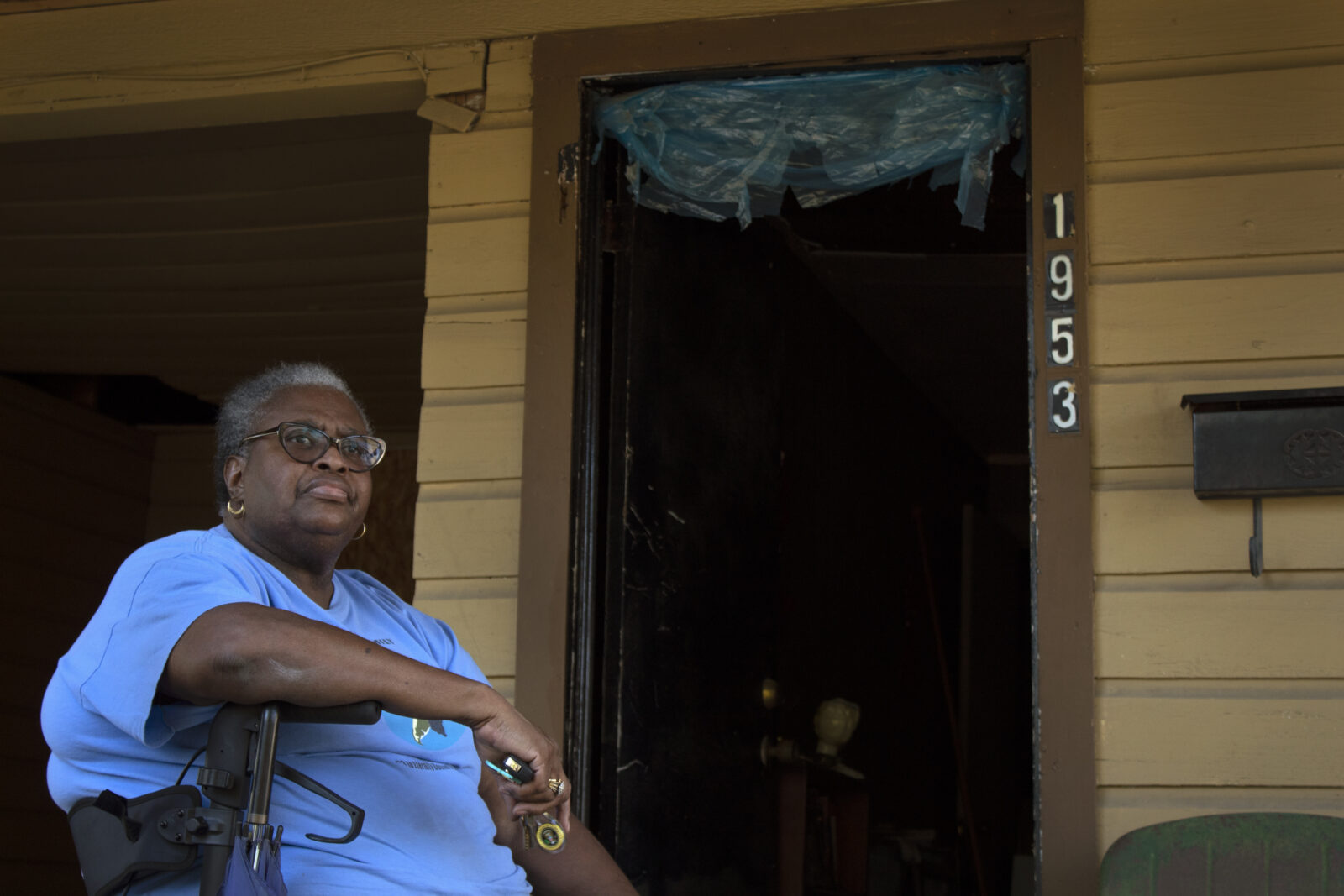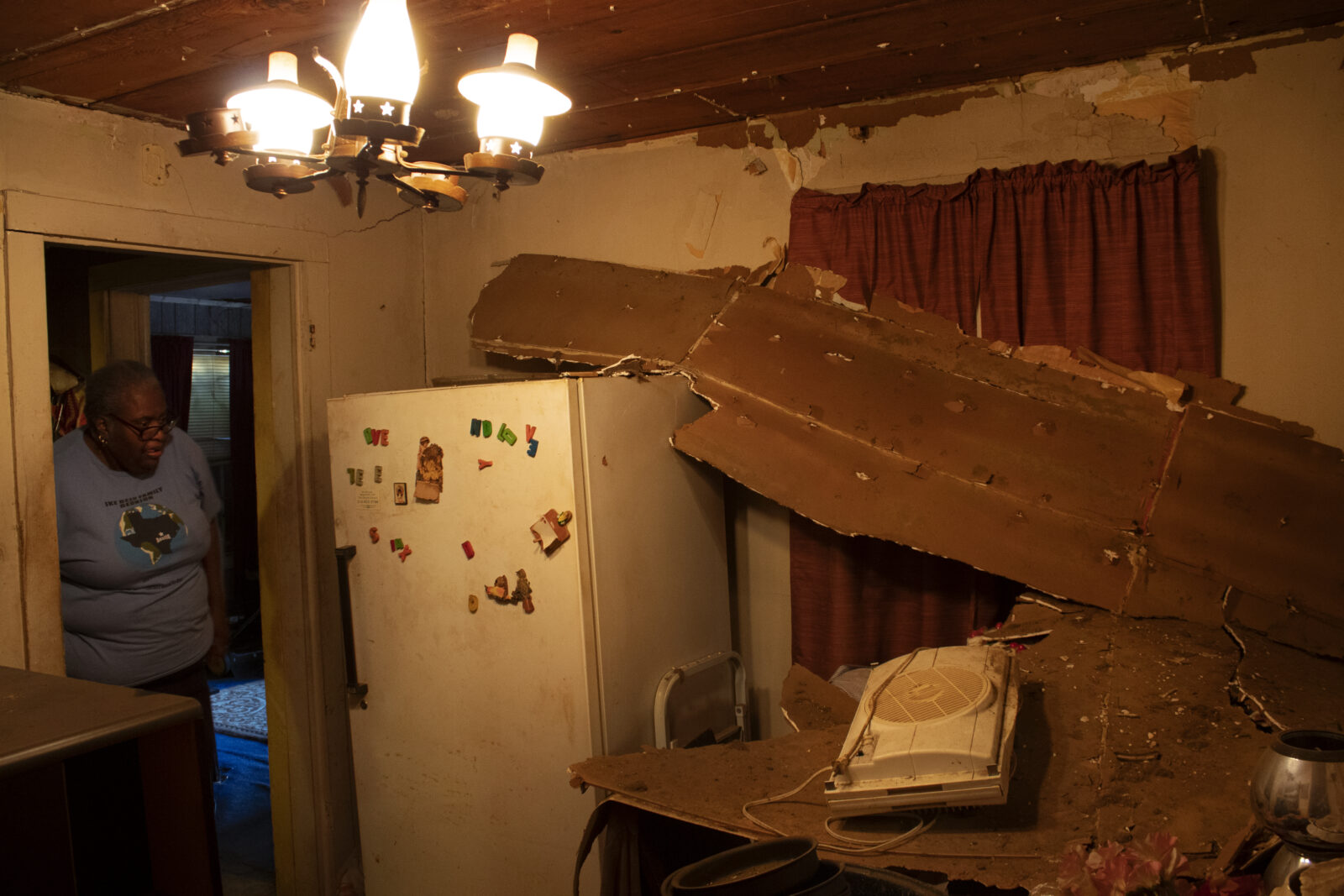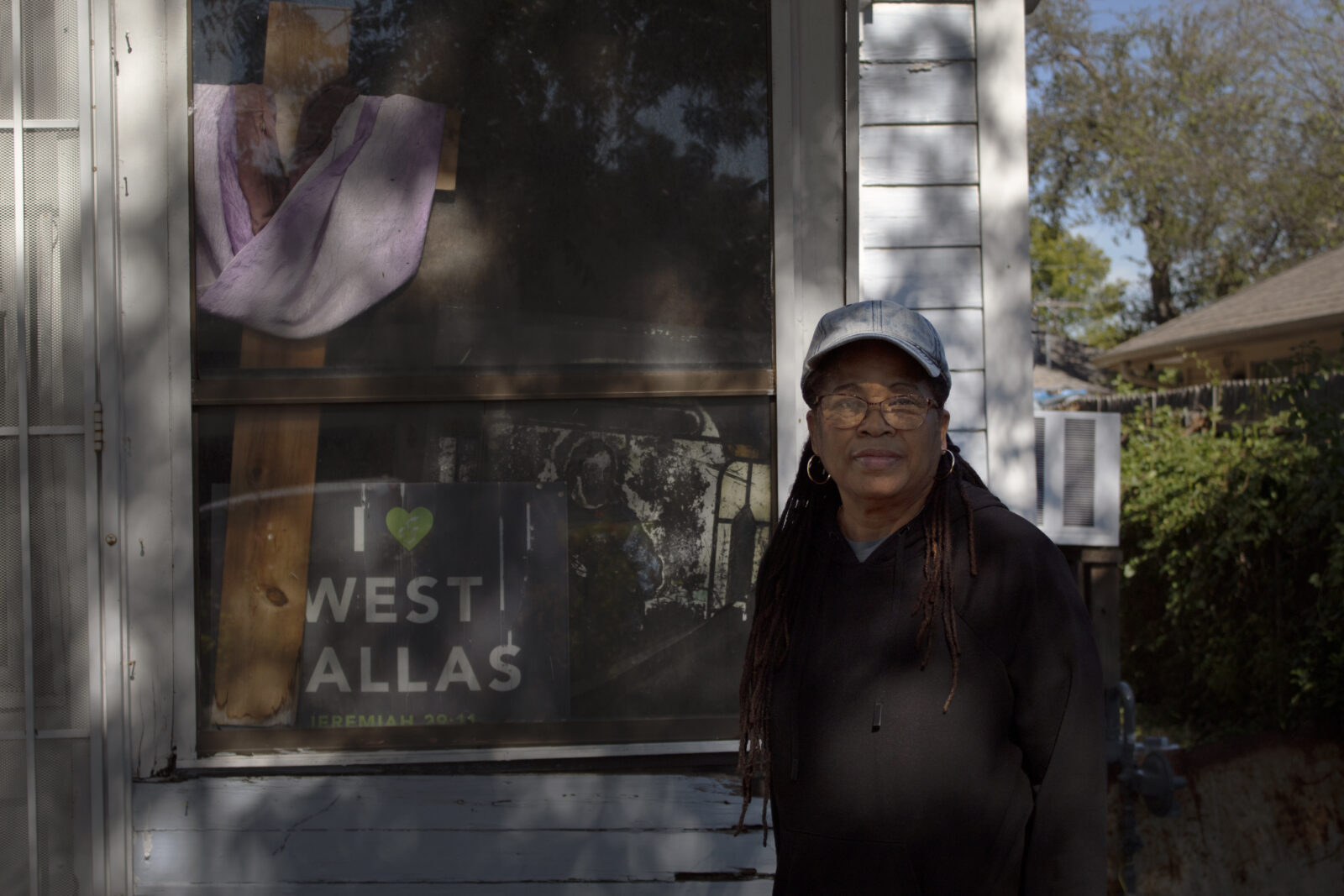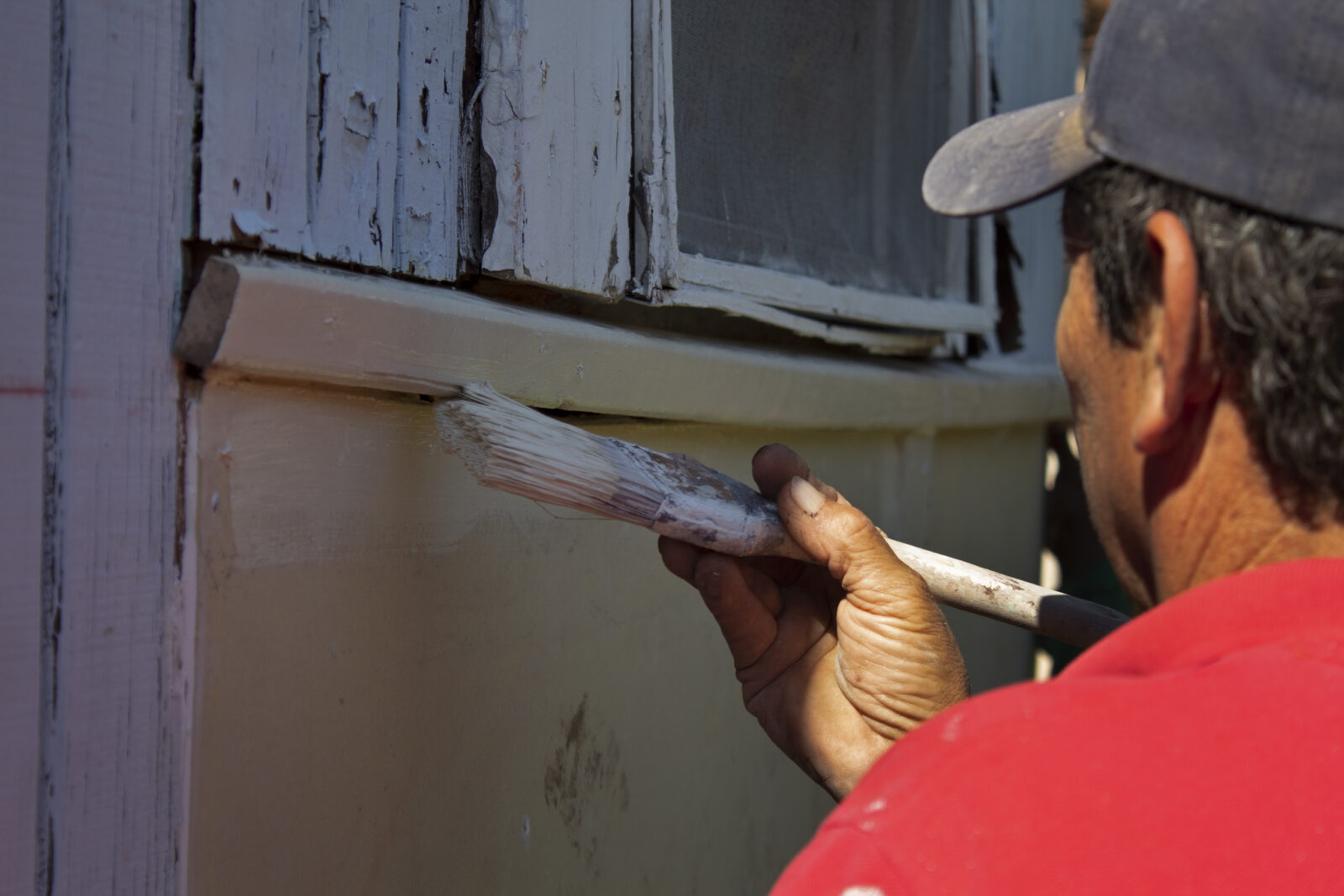The City created a home repair program for West Dallas residents, but they’re struggling to qualify
Every afternoon, 67-year-old Patsy Ruth Jackson visits her home on Shaw Street. She shuffles through the mail on her porch, checks the doors and windows, then returns to her sister-in-law’s house to spend the night. She’s been doing this since 2020.
Today, as she walks through her house, she carefully steps on the uneven floor of her living room where chunks of sheetrock are scattered all over her belongings.
“I’m not an animal,” Jackson says. “Ain’t no way I’d leave my house if everything was in working condition. But I cannot keep living in this house. If it caved in, it’s gonna kill me.”
The house has been in Jackson’s family for 70 years. When her mother died in 2016, the house she inherited was in bad shape. As co-director of her neighborhood association, Victory Gardens, Jackson learned about the West Dallas Targeted Rehab Program, a City of Dallas neighborhood revitalization effort designed to provide financial assistance for home repairs.
Jackson applied, hoping to qualify for its offer of up to $10,000 in home improvements for West Dallas homeowners.

The program launched in December 2020 with $2 million — enough to tackle repairs for at least 200 homeowners. It’s been nearly two years, however, and the program hasn’t been able to spend those city tax dollars, despite the great needs among aging homes in the seven Census tracts of West Dallas the program targets.
So far, the program has committed roughly $800,000 for about 90 eligible applicants, according to Thor Erickson, area redevelopment manager with the City’s department of housing and neighborhood revitalization. He says the goal was to complete 200 home repair projects and spend the $2 million within an 18-month period.
The city didn’t meet its goal, Jackson says, because applicants are finding the city’s requirements to be too strenuous. In order to qualify for the program, West Dallas residents have to meet a laundry list of demands: make less than $76,900 a year, live in the home as their primary residence, have home insurance, have a clear title and be current on their property taxes and mortgage payments.
Dallas Free Press filed an open records request to find out how many West Dallas residents had applied, been rejected or approved, and how much money had been allocated. We found that between December 2020 and July 2022, about a third of all applications were denied. However, the number could be higher. Jackson’s application was listed as “pre-construction” in our open records request, but she eventually was denied because she couldn’t afford to purchase home insurance.
Erickson says applicants are ineligible for multiple reasons. Some make too much money, he says, and our open records request also shows repeated disqualifications for residents who didn’t have a clear title of home ownership or who didn’t respond to communication efforts from the department. In other cases, applicants opt out of the program with hopes of finding greater assistance elsewhere because their home repair costs, as assessed by city inspectors, exceed the $10,000 the West Dallas TRP can provide, Erickson says.
Jackson managed to qualify for homeowner’s insurance with Allstate, which was priced at more than $2,000 for the year, but the company canceled her policy when the home failed to pass inspection. American Modern Insurance Group sent her three quotes that still were too high for her to consider: $3,519, $3,100 and $2,401. Jackson says she can’t afford the insurance with a fixed income of $923 a month.
“That’s what really discourages me, when you try so hard to go by their guidelines,” Jackson says. Even though her finances were tight, she had decided to pay for the Allstate insurance, reasoning “Hey, I’m struggling, but I’m gonna do this if it gives me some help. And then somehow it all turned.”
Without home insurance, Jackson no longer qualifies for the West Dallas TRP home improvement grant.
Erickson says the City requires homeowners insurance to protect its investment in the home, and the program also enforces a five-year deed restriction on the property. This means residents must maintain the repairs and live in the home — they can’t rent, sell or transfer the property for five years, according to the Comprehensive Housing Policy. The intent of the policy, established in March 2017, is to create and maintain available and affordable housing throughout Dallas, promote greater fair housing choices, and overcome patterns of segregation and concentrations of poverty through incentives and requirements. The West Dallas TRP is one of many under the policy’s umbrella.
These improvement programs are helping to improve the housing quality to better the overall well being of residents, says Ashley Flores, who focuses on local housing inequities as a senior director at the Child Poverty Action Lab.
“It’s not just about building more housing; it’s about maintaining and preserving the housing stock that we have,” Flores says.
Toward this goal, several city and county programs help with home repairs. Before she died, Jackson’s mother applied to the Weatherization Assistance Program from the Dallas County Health and Human Services for minor home repairs for the holes in her roof. The inspector found Jackson’s mom needed a new roof, but the repairs couldn’t be approved because the home’s foundation was in terrible condition. The county didn’t require housing insurance as a requirement, but Jackson’s family home was in such bad shape, she says, the inspector didn’t want to touch the house because it was in danger of falling down.
Jackson eventually turned to the nonprofit Advocates for Community Transformation. The organization stabilized her mother’s home and built a new roof pro bono.

“I thank the last people that did help, at least tried,” Jackson says. “They helped her. When it would rain here, I would just sit and just cry. I had to put out pans and buckets and it got so bad when a storm came through. It literally felt like the heavens opened up. The more buckets I put out and emptied, the more it rained. I told her, we can’t keep living like this.”
Jackson recently applied for the Home Improvement Preservation Program (HIPP), a city program funded by the federal Housing and Urban Development Department. The restrictions for this program mirror the West Dallas TRP. Jackson hoped to receive a forgivable loan up to $73,170 to repair her home, but after applying for the second time this year, she again was declared ineligible.
She was denied the first time because she was unaware of a lien on the property when the City had previously cut her lawn. This year, she submitted the West Dallas TRP application prior to applying for HIPP, which disqualifies her from eligibility because HIPP does not allow applicants to receive funding from another program simultaneously.
Living alone and on a fixed income, Jackson says to try to cover expenses and meet all of the criteria for the programs — it is not enough.

Rayella Delley Boyd, 66, president of Neighbors of Homestead, is a West Dallas TRP success story. She received a $10,000 grant from West Dallas TRP to fix her home’s foundation. The home was passed down to her when her mother died, and her foundation work was finished this week.
“I do appreciate the work that is being done on my house,” Boyd says. “The foundation was needed. I appreciated the help.”
However, while doing the work, the contractor removed siding from various parts of the home in order to excavate underneath, but installed new siding panels only along the kitchen and left it feeling incomplete, Boyd says. She pointed out the other areas could have been covered as well, but it was not budgeted as part of the City grant.
This increases Boyd’s renovation costs. She also needs to replace deteriorating wood siding, and that will cost approximately $2,500. However, she doesn’t know where the money will come from. She receives government assistance for her utility bills and community help for grocery expenses, but says she has managed to start saving “a little bit ”of her Social Security disability insurance of $1,500 a month.

West Dallas residents need programs to help “overcome decades of disinvestment” to ensure they can “stay safely and securely in their homes that have been part of their families for generations,” Flores says.
City Councilmember Omar Narvaez championed the West Dallas TRP when it launched in December 2020, noting that the decision to spend unallocated bond dollars on home repairs was made by residents, and touting that he was able to get the full council’s support for the program. He told Dallas Free Press he was unavailable to talk about the program’s current state for this follow-up story. He sent a statement:
“I have full faith that as city staff continues to work with West Dallas nonprofits that this program will help more working families as we continue to build stronger neighborhoods together.”
Erickson agrees that the City has to continue to build good relationships with the people in the communities they serve.
“There is a history that we work within, that has not always treated people fairly. Some people are very hesitant to work with us,” Erickson says.
Jackson says she had hoped to work with the City, but says her experience in the end was yet another example of barriers too difficult to overcome.
The department of housing and neighborhood revitalization has kept the application process rolling. The program will end whenever the entire $2 million has been committed and spent, Erickson says.
Visit the Housing and Neighborhood Revitalization TRP website has the following resource for residents:
- Frequently asked questions in English or Spanish
- General West Dallas TRP information in English or Spanish
- Bilingual West Dallas TRP application
Applications can be dropped off at the following locations:
- Builders of Hope: 2215 Canada Dr. Dallas, TX 75212
- Voice of Hope: 4120 Gentry Dr. Dallas, TX 75212
- Wesley Rankin Community Center: 3100 Crossman Ave. Dallas, TX 75212
- Brother’s Bill Helping Hand: 3906 N Westmoreland Rd. Dallas, TX 75212
- Dallas West Church of Christ: 3510 N Hampton Rd. Dallas, TX 75212
- Ledbetter Eagle Ford Community Food Pantry: 5227 Nomas St. Dallas, TX 75212
- Dallas West Branch Library: 2332 Singleton Blvd. Dallas, TX 75212
Share This Story, Choose Your Platform!
Areas of Expertise:
Government accountability in South Dallas and West Dallas
Location Expertise:
Dallas, TX
Official Title:
Community and Communications Coordinator
Email Address:
jeffrey@dallasfreepress.com






I would like I would like to reapply